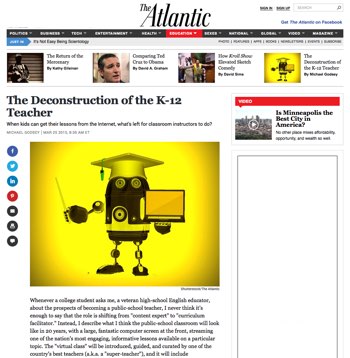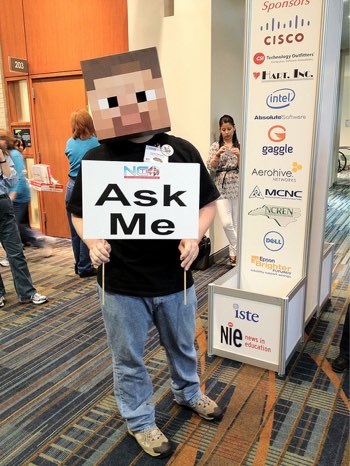In my new situation of retired educator (or semi-retired educator. I can’t really decide), I find myself paying less attention to Twitter and more to friends and relatives on Facebook. But this morning, when I started my computer and Twitteriffic flashed up, I scanned through the most recent tweets from my long-time and famous educator friends – and my eye landed on one by Doug Peterson actually a retweet of Miguel Guhlin’s,

The Deconstruction of the K-12 Teacher is a March 25 article in The Atlantic written by Michael Godsey, a “veteran high-school English educator.” Asked by a college student about the prospects of becoming a public-school teacher, he writes,
I never think it’s enough to say that the role is shifting from “content expert” to “curriculum facilitator.” Instead, I describe what I think the public-school classroom will look like in 20 years, with a large, fantastic computer screen at the front, streaming one of the nation’s most engaging, informative lessons available on a particular topic. The “virtual class” will be introduced, guided, and curated by one of the country’s best teachers (a.k.a. a “super-teacher”), and it will include professionally produced footage of current events, relevant excerpts from powerful TedTalks, interactive games students can play against other students nationwide, and a formal assessment that the computer will immediately score and record.
To that, I say, “poppycock!” How’s that for post-career reflection and rejection of the ideals that I seemingly promoted for the last 20+ years? But the fact is that I never promoted such a future for the classroom and find the arrangement to be personally revolting and counter-productive to what I believe the purpose of education to be.
It’s an interesting question and one that many of us have challenged ourselves and each other with, “What is the purpose of school.” Here’s a good answer, in my opinion – Why School by Will Richardson and what is described in Invent To Learn, by Sylvia Martinez and Gary Stager. But here is my ready answer that is short and to the point.
The purpose of school is to prepare our children for adult life during the next 70 to 80 years.
Life doesn’t happen on a video screen and it can’t be simulated with a game. Goddey’s “fantastic computer screen” will help as will the games and video clips from top thinkers on TED. In fact, they are essential. But the fallacy is the assumption and fear that technology replaces the teacher.
To be sure, nobody in education, but those in the darkest recesses of denial, believes that the role of the teacher is not changing. The shift from “content expert” to “curriculum facilitator” is certainly happening – and it should. But NOTHING, my most loyal readers, IS EVER THAT SIMPLE.
A phrase like “sage on the stage to guide on the side” is intended as an idiom to focus the attention of experienced professional educators who already grasp the changing conditions that are reshaping school. It is not an all-encompassing description of the future of classroom instruction. Frankly, while reading Godsey’s advice to his student, I saw no need for classrooms at all – and that’s the last thing I’d want to see for my grandchildren and their children.
We have to acknowledge that there is a powerful cabal that desires and promotes just the scenario described by Mr. Godsey. They fancy an education system that spends its billions on their videos, games, tutorials and assessment products, instead of unionized public school teachers. Products, whose service can be measured (test scores), can be marketed.
In my mind the most preposterous statement in the whole article is the advice of a superintendent, aired on NPR, “If you can Google it, why teach it?” ..and this gets back to the question, “What is the purpose of school?” If education’s objective is to equip our children with facts that they can recall on state test day, then I would agree with the superintendent’s statement. But if its purpose is to prepare our children for adult life, then the job of the teacher is to help learners to understand what they’ve Googled and develop the essential literacy skills and habits of questioning, analyzing and assigning context to the Googled information.
What we can predict about life in the next 70 to 80 years is almost nothing, beyond the timeless practices of responsibility, compassion and providing value to the community. It will continue to be a time of rapid change, inventions that redefine how we accomplish our goals and discoveries that challenge our beliefs and philosophies.
The common core subject of every classroom today should be learning to learn.
And this brings us back around to Michael Godsey’s apparent fear that his college earned knowledge of literature has become obsolete. Our classrooms still require experts. But experts today are no longer known for knowing all there is to know about a subject.
Today’s experts are known for being highly skilled at learning and relearning the ever growing and often changing knowledge about their subject.
This is the notion of expertise that teachers need to model and that students need to see every day, the essential and constant practice of contextual learning-skills / learning-literacies.
Adult life is about learning.




